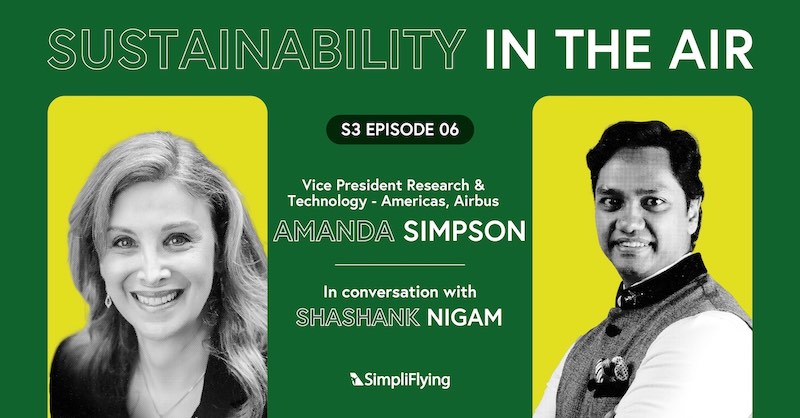NEWSLETTER
In Conversation: Holly Boyd-Boland, Virgin Atlantic


You can listen and subscribe to the podcast on Spotify, Apple Podcasts, Podcast Addict and Google podcasts.
Here’s a deep dive into the episode:
Airbus, Simpson begins by saying, is pressing forward as hard as it can to meet not only external goals but even more aggressive internal goals. “Aviation might only be about 2% of carbon emissions today. But as all the other sectors work to decarbonise, if we don’t do anything, that number will grow and become unmanageable”, she warns.
Simpson says that over the past decade Airbus has tried a variety of different technologies, either through demonstrators or paper studies. The end result is that the company now firmly believes that hydrogen has the potential to offer a true clean fuel solution to not just aviation but other industries as well. “When you utilise hydrogen, the only byproduct is water”, states Simpson. “So we determined that that’s the way that the aerospace industry has to go.”
In 2020, Airbus revealed three concepts for zero-emission commercial aircraft that could enter service by 2035. The three concept aircraft – all code-named “ZEROe” – rely on hydrogen as a primary power source. In early 2022, Airbus announced the ZEROe demonstrator that will test the potential of hydrogen-powered commercial flights on a modified A380 platform.
Airbus has set itself apart from others in the hydrogen space by firmly betting on hydrogen combustion as the way forward. Others, such as Universal Hydrogen and ZeroAvia, for instance, rely on retrofitting existing aircraft with hydrogen-electric power trains. (Universal Hydrogen recently completed a major test flight on a Dash-8 fitted with the largest ever hydrogen fuel cell.)
Simpson is appreciative of their efforts and says that Airbus fully supports their endeavours. However, she is quick to note that because these companies are modifying existing aircraft and leveraging existing technologies, the efficiency isn’t at the level Airbus believes it needs to be in order to have a viable commercial aircraft. Which is why Airbus is pushing ahead with testing new concepts, especially since today’s jet turbines aren’t designed to handle hydrogen combustion.
That said, Simpson says Airbus is “absolutely in line with hydrogen electric”. In fact, Airbus recently announced a fourth concept aircraft as well as its progress on developing a hydrogen electric fuel cell pod. The company’s official statement says that Airbus has been conducting studies and tests to realise a fully working megawatt-class fuel-cell engine and demonstrator which could be tested in flight by around 2026.
While Airbus’ championing of hydrogen promises to change the nature of flying forever, the Hydrogen Science Coalition wants us to hold our horses. By a back-of-the-envelope estimate, there is likely to be a 15 to 20% payload reduction on a Boeing 787 running on liquid hydrogen as compared to Jet A fuel.
Simpson says that the numbers can be tricky to crunch while equating jet fuel to hydrogen. For example, every kilo of hydrogen contains three times as much energy as an equivalent unit of jet fuel. So only about one-third of the weight of fuel will be required. However, hydrogen takes up much, much more volume (the gas is 8972 times less dense than jet fuel). Even after compressing and liquefying, hydrogen takes up four times the volume of up to jet fuel.
In order to store the liquid hydrogen, one needs cryogenic, super cold tanks that are extremely heavy. The weight of the tanks becomes an issue. Simpson agrees with the basic calculation: “if you’re going to try to put all of that weight into an existing airframe, you’re going to have a payload penalty.”
However, Simpson argues that if an aircraft is designed from the outset to meet particular performance parameters, flight range, and payload capability based on a hydrogen propulsion system, there won’t be a weight penalty. Airbus is focusing on clean-sheet design for this very reason, so that they can focus on delivering the benefits of hydrogen without being hamstrung by existing aircraft designs.
Aircraft are the very basis of aviation. While the quest for innovations to decarbonise aviation continues, making aircraft efficient remains one of the most promising near-term solutions. There is hardly any doubt then about the responsibility that falls on airframers.
The aviation industry is heavily fossil fuel dependent and there are no clear alternatives to decarbonise effectively. The industry often faces severe backlash from climate activists who accuse it of being negligent and wasteful at its very core. While these accusations are not unfounded, air travel cannot be wished away or asked to shut shop. We need to embrace available solutions while investing in newer innovations.
While there is much excitement about the potential of various technologies to help the industry reach net zero by 2050, Simpson is right to strike a cautious note about the importance of thinking long-term. Today’s aircraft – many thousands of them – will still be around for another 20-30 years. As much as we’d like green aviation to become a reality, we need to be pragmatic. The climate crisis wasn’t seeded in a day, and its cure isn’t likely to arrive in a day either.
Our Sustainability in the Air podcast is powered by SimpliFlying which has been helping build trust in travel for over a decade.
Season 3 is brought to you by our sustainability partners, Cirium and CarbonClick.
What Can We Learn From United’s Newly Appointed Chief Trash Officer, Oscar The Grouch? (SimpliFlying)
Industry Urged To End ‘Glamourisation’ And Incentives For Frequent Flying (Travel Weekly)
A Sudden Rush to Make Sustainable Aviation Fuel Mainstream (The New York Times)
Boeing And CSIRO Study Sustainable Aviation Fuels (AuManufacturing)
Elon Musk Unveils A New Master Plan, A Path To Sustainable Energy Future (The Verge)
© 2022 SimpliFlying Pte. Ltd.